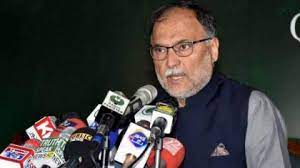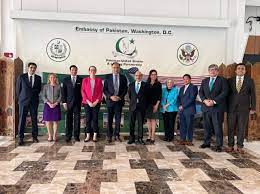CPEC has transformed Pakistan from a security state to an economic state, Planning Minister tells US delegation

Islamabad: Federal Minister for Planning, Development and Special Initiatives Ahsan Iqbal told a visiting US delegation on Thursday afternoon that the China-Pakistan Economic Corridor (CPEC) had played a key to transform Pakistan from a security state to an economic state.
Iqbal stressed that Pakistan had long been struggling to change its identity from a security state to an economic state, and CPEC played a significant role in doing so when the world started looking at Pakistan as an investment destination.
The minister was talking to the visiting US delegates who called on him here that enhancing productivity was one of the key priorities of the government not only to avoid food inflation but also to create a value chain.
The delegation was headed by Counselor of the United States Department of State, Derek Chollet. US Ambassador to Pakistan Donald Blome and others also joined the meeting.

Iqbal maintained that Pakistan, in collaboration with the United States, started the US-Pak Knowledge Corridor which turned out to be a paradigm shift from our long-time strategic partnership to developing human resources. “Primarily, Pakistan wanted to train 10 thousand PhDs from the top US universities in the coming ten years.” The US delegates appreciated the government’s resolve to give Pakistan a soft identity and focus on improving the economic, energy, education, health, food, and agricultural sectors.
Iqbal mentioned that the government was committed to introducing socio-economic reforms and agriculture is one of the major areas to be equipped with modern technology to boost production through smart agri practices.
Ge remarked that ignoring the exports sector and relying on imports had been one of the key reasons for our failure on maintaining a balance of payments.
He said the incumbent government was trying to divert the orientation of industrial and corporate sectors from domestic to foreign markets since it was the only way to earn Dollars, increase foreign reserves, and ensure the balance of payments.
Similarly, he added, the government was paying special focus on increasing IT exports since almost two-thirds of our population comprised of the youth and they played a key role in making Pakistan the third largest country in the world in freelancing.
The minister emphasised that Pakistani youth had greater potential and seamless talent in almost all walks of life and there were enormous opportunities for the US companies to collaborate with Pakistani companies, which offer relatively less-costly services compared to India and other countries.
He highlighted that Pakistan had recently experienced the worst natural calamity in the form of countrywide floods caused by relentless torrential rains last year.
These floods adversely affected 33 million across 94 districts of Pakistan and displaced 2 million households, Iqbal added.
Ahsan Iqbal informed that the Government of Pakistan was working on short-term and long-term plans under the Resilient, Rehabilitation, Reconstruction and Recovery Framework (4RF) for the planning, financing, implementation, and monitoring of recovery and reconstruction of the areas which had undergone unprecedented floods in 2022.
He elaborated that Pakistan was working on a 10 years plan evolving the national flood protection plan and taking tangible steps to cope with the challenges posed by climate change.
The minister maintained that Pakistan had been facing multiple socio-politico-economic challenges and the government was focusing on putting the economy back on track by devising the frameworks for the short to medium-term to recover from the ongoing crunch.
“For this purpose, five key thematic areas comprising the exports lead growth, e-Pakistan based on the power of modern IT-based technologies and systems, environment, energy, and equity,” he underlined.





